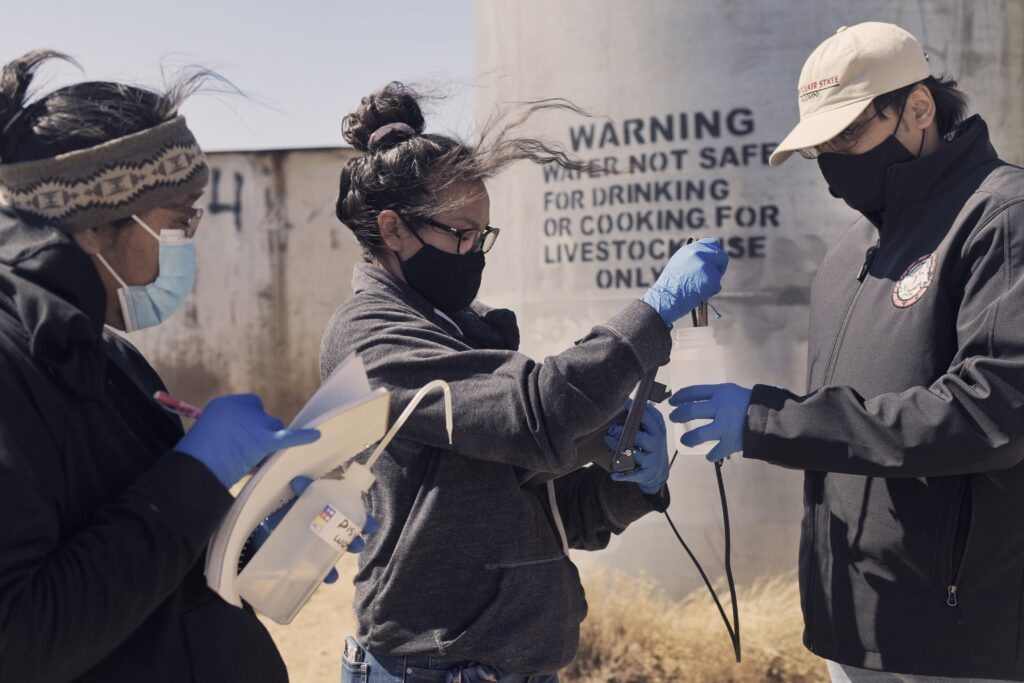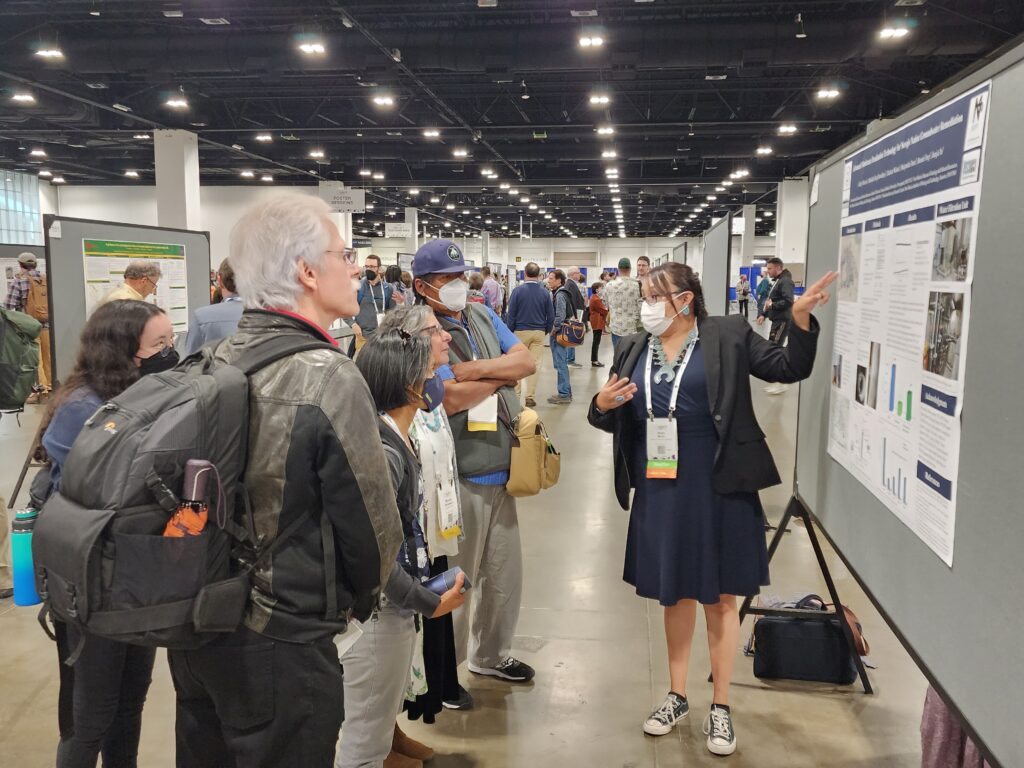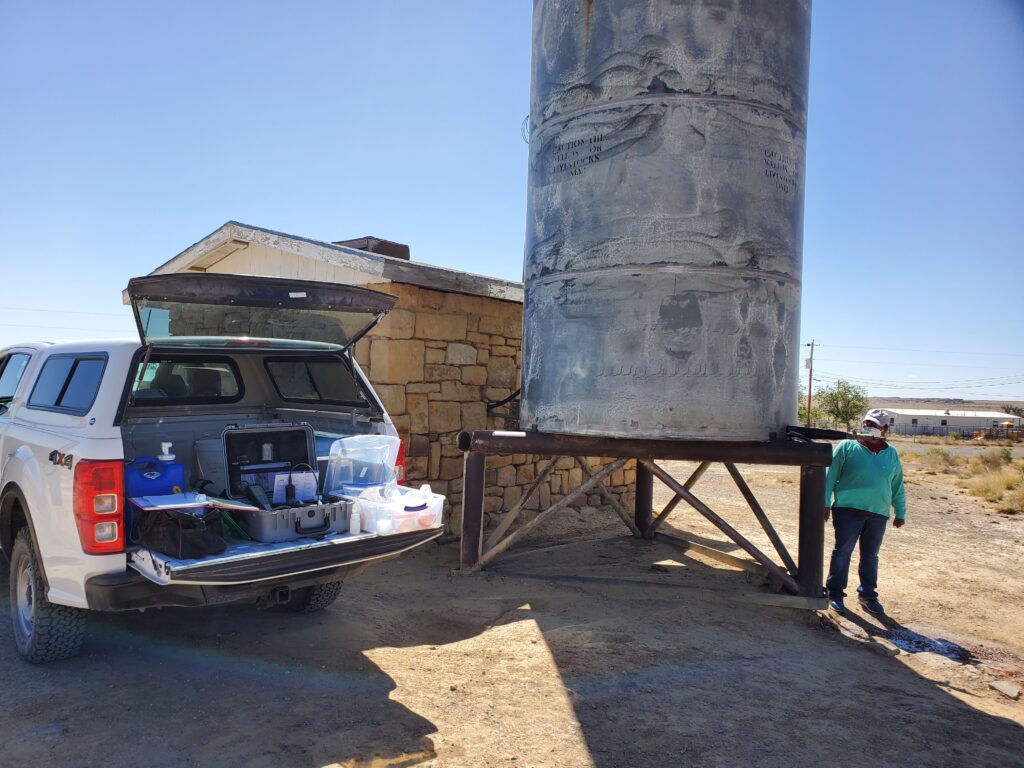Navajo Technical University Professor Abhishek RoyChowdhury is leading an effort to bring ‘clean, safe, and reliable’ water to the Navajo Nation
By Wafa Hozien

In a world where access to clean drinking water is often taken for granted, the plight of the Navajo people stands as a stark reminder of the challenges faced by marginalized communities. Dr. Abhishek RoyChowdhury, associate professor of environmental science at Navajo Technical University, has embarked on a groundbreaking project to address the water crisis on the Navajo reservation. The goal is to provide safe and sustainable water solutions, empower local residents, and inspire a new generation of Native American scientists.
The project was initiated in 2020, during the peak of the pandemic, when Navajo Technical University (NTU) and New Mexico Institute of Mining and Technology (NMT) collaborated to develop a filtration system and initiated the NTU-NMT Navajo Nation Water Purification Project. The dire consequences of the inadequate water infrastructure were by then apparent. Thirty percent of Navajo residents lacked water in their homes and groundwater contamination rendered the available water undrinkable. The existing windmill-powered water sources, intended for livestock use, also presented health risks since cattle that drank contaminated water accumulate heavy metals in their bodies.
Community engagement drives the project
RoyChowdhury recognizes the importance of understanding the Navajo culture and involving the community in implementing any technology. With a team of students from the local community who possess intimate knowledge of the water-related challenges, the project incorporates the Diné philosophy of education. This philosophy emphasizes engaging with the Navajo Chapter Houses, the local governing bodies, and obtaining their permission to ensure the project’s acceptance and benefits are clear to the community members.
The project relies on innovative desalination units that filter water through hollow-fiber membranes. By the end of this year, the first units, manufactured by their industry partner, Process Equipment & Service Company, Inc., will be deployed and operational. The project’s initial phase focuses on providing safe water for livestock management and irrigation, followed by ensuring drinkable water for human consumption. Pilot models will also be introduced to high schools, showcasing the technology’s functionality and potential mobility. Maintenance of these units will be undertaken by students from the community, ensuring sustainability and local involvement. Other community members will be trained on maintenance as well.
The project also creates educational and employment opportunities for Navajo students. By involving them in every aspect, from developing the technology to acting as official translators between scientific discussions and community members, RoyChowdhury nurtures a local workforce. Through partnerships with universities and organizations, the NTU students go on to be graduate students and have opportunities for experiential learning, becoming role models for future generations.
Working with tribal, federal, and industry partners
During planning and implementation, RoyChowdhury actively engages with Navajo Nation committees, Chapter Houses, and Navajo Nation administrators. This community-centric model is vital for the successful adoption and long-term maintenance of the water filtration units.
The project has also garnered support from various organizations and federal partners. Collaborations with the Bureau of Indian Affairs; National Science Foundation; Alfred P. Sloan Foundation; Department of Energy; Intera; University of California, Berkeley-based West Big Data Innovation Hub; Water Resources Action Project, Inc.; and Water with Blessings have provided funding, technical expertise, and valuable resources. These partnerships exemplify the collective commitment to address the water crisis and uplift the Navajo people. Partnerships with federal agencies, universities, and organizations showcase the collaborative nature of this endeavor. The support provided by these partners demonstrates a shared commitment to addressing the water crisis and improving the quality of life for Navajo communities. It highlights the importance of collective action and cooperation in tackling complex issues that affect marginalized populations.

As the project moves forward, RoyChowdhury and his team continue to face challenges caused by the unique nature of the wells and the variety of contaminants present in the water of each individual well. However, their dedication and willingness to learn from mistakes ensure that they adapt and refine their solutions to meet the specific needs of each community. By providing access to safe and sustainable drinking water, they not only address a pressing crisis but also empower the community, foster educational opportunities, and inspire a new generation of Native American scientists.
In this way, the impact of their work extends far beyond the immediate benefit of safe water—it lays the foundation for a more sustainable and resilient Navajo Nation, where cultural heritage and environmental well-being are intertwined.
Planning for the future
In their next five-year plan, RoyChowdhury and his team aim to establish the Navajo Nation Water Institute, which will provide free water testing services to any community member in the Navajo Nation. This initiative recognizes the importance of ongoing monitoring and ensuring the long-term sustainability of the water solutions implemented.
Additionally, the team aims to expand the deployment of water filtration units, with a goal of rolling out at least ten more units in the coming years. This expansion will further increase access to clean and safe drinking water for communities across the Navajo reservation.
In line with their commitment to supporting students, RoyChowdhury plans to continue providing stipends and experiential learning opportunities for Navajo students. This investment in education and hands-on experiences will not only equip students with the necessary skills but also inspire them to become agents of change within their communities. The collaboration with various partners, including federal agencies, universities, and organizations, will remain crucial in realizing these future plans. By leveraging these partnerships, RoyChowdhury and his team can access funding, technical expertise, and additional resources to expand their impact and reach.

The ultimate vision is to create a sustainable water infrastructure on the Navajo reservation that not only addresses the immediate water crisis but also lays the groundwork for a healthier and more resilient community. This comprehensive approach encompasses education, technology, community involvement, and long-term maintenance.
The journey to address the water crisis on the Navajo reservation is ongoing, and challenges may arise along the way. However, with the passion, expertise, and collaborative spirit of Dr. Abhishek RoyChowdhury and his team, along with the support of the Navajo community and their partners, there is a clear path forward. Together, they are working towards a future where every individual on the Navajo reservation has access to clean, safe, and reliable drinking water—a future where the fundamental right to water is fulfilled for all. We always need to remind ourselves that access to clean water is not a privilege, but it is a human right. The theme of this project revolves around a common Navajo belief Tó éí ííná , which translates as Water is life.
Dr. Abhishek RoyChowdhury’s pioneering efforts to provide drinkable water on the Navajo reservation are a testament to the power of community engagement, cultural understanding, and scientific innovation. Through his project, he not only addresses the immediate water crisis but also fosters a sense of empowerment within the Navajo community. By involving local students in all aspects of the project, RoyChowdhury ensures that the solutions are tailored to the unique challenges and cultural context of the Navajo people.
• • •
Wafa Hozien, Ph.D. is a university academic affairs administrator that collaborates to facilitate the creation of innovative accredited university programs throughout the United States. Dr. Hozien can be reached @wafahozien on Twitter and Instagram.
Story published June 23, 2023
• • •
Enjoyed this story? Enter your email to receive notifications.
